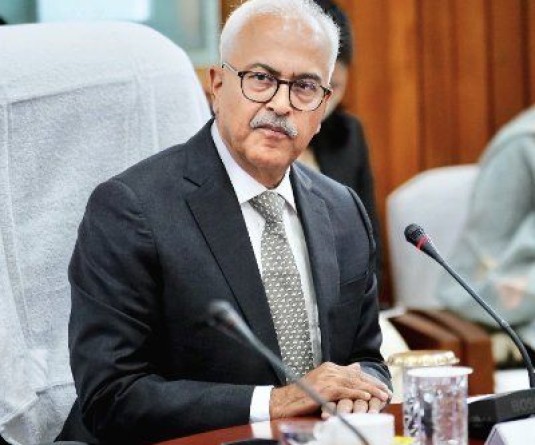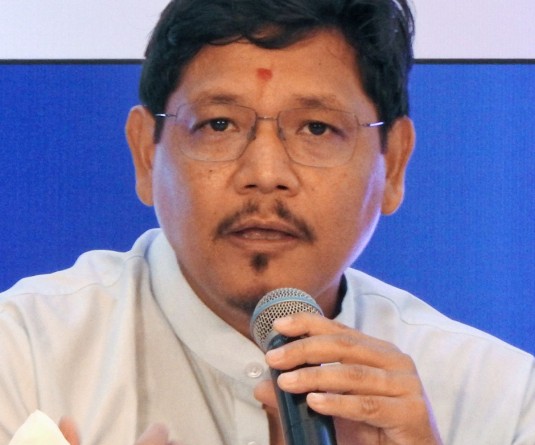
Kohima | July 30 : The beneficiaries of “DBT’s Mission planting material and utilization” have a great reason to rejoice with the progress of the farming activities under such project.
The project, a multi-institutional collaborative programme under the Department of Bio Technology, Government of India, was undertaken for Nagaland by Nagaland University (NU) and implemented by Entrepreneurs Associates (EA).
Speaking at the farmers meeting for the related project held here today at Hotel Japfu, , Prof. K. Kannan, vice chancellor, Nagaland University was all praise the farmers from Phek district for making a remarkable progress in farming activities and a sense of competitiveness among them.
Prof. Kannan stressed on the need to have better marketing system of the produces and also, encourage them to grow further in the farming activities.
He also informed the farmers to make the best use of the amount generated from the farming activities and send their children to good educational institutions.
Further, he assured to provide more funds towards this project in the coming days as well.
EA’s CEO Neichute Doulo stated that the project targeted to experiment with various cash crops cultivation and find out their viability in Nagaland selecting Khasi Mandarin, Large Cardamon, Banana, edible bamboo, cashew nut and Kiwi as identified crops.
The project targeted to cultivate 200 hectares for all these crops in three years time with a total cost of Rs. 109.45 lakhs to be released in 3 installments.
“However, due to various hurdles and problems in Nagaland University, the project had to suffer many hiccups. This led to the release of only one installment of Rs. 36.51 lakhs ie. 33.33% out of the total project fund. Nonetheless, Entrepreneurs Associates and the Department of biotechnology, NU under the guidance and leadership of esteemed vice chancellor Prof. K. Kannan, achieved 55.72% of the project activities,” said Doulo.
The success was also make possible because of the sacrificial investment made by 323 farmers spread in nine villages - Phola, Upper Kho, Lower Kho, Porba, Chizami, Thetsumi, Losami, Razeba and Chesezumi, covering 5 mountain ranges.
Doulo said that project has made immense positive impact on the lives of 323 farmers, adding “ Perhaps this has been the first time that NU has made such a positive impact on the lives of so many farmers.”
According to the findings of the project, Doulo said Kiwi is doing very well in Nagaland. Last year some farmers harvested some Kiwis from those planted in 2008. This year, the Kiwi plants of 2008 will be producing at least 300 Kgs. And some Kiwi plants of 2009 are already bearing fruit this year. It is estimated that at least 10 metric tones will be harvested from the DBT project in 2013. This would generate income to farmers of Rs. 11 lakhs assuming that 1 kg of Kiwi costs Rs. 110.
Large cardamom is also doing very well. Farmers expect to harvest at least 1000 kgs in 2012 (in dry weight). By 2013, they expect to harvest at least 3 metric tones (dry weight). Given the local price of Rs. 800 per dried kg of Cardamom last year, farmers would be getting an income of Rs. 24 lakhs.
The finding also stated that Banana has also proved very successful. Farmers have already being supplying banana to Kohima since 2010. They have already supplied about 200 metric tones. This has generated income of Rs. 10 lakhs already for farmers. In the coming years, this trend will only double up.
The important finding is that Cashew nut is not doing well in the Naga hills. And edible bamboo supplied from Assam are not as viable as the local bamboos of Nagaland. Further, the banana species supplied from outside are not as good as the native species in the hills although there are bearing fruit.
“This learning can be a beacon for policy makers in the future. I am confident that much more can be achieved, and certainly, there is gold mine to be discovered in horticulture sector of Nagaland,” said Doulo adding that the NU-DBT project has only unfolded the tip of the iceberg of horticulture gold mine of Nagaland.
The project, a multi-institutional collaborative programme under the Department of Bio Technology, Government of India, was undertaken for Nagaland by Nagaland University (NU) and implemented by Entrepreneurs Associates (EA).
Speaking at the farmers meeting for the related project held here today at Hotel Japfu, , Prof. K. Kannan, vice chancellor, Nagaland University was all praise the farmers from Phek district for making a remarkable progress in farming activities and a sense of competitiveness among them.
Prof. Kannan stressed on the need to have better marketing system of the produces and also, encourage them to grow further in the farming activities.
He also informed the farmers to make the best use of the amount generated from the farming activities and send their children to good educational institutions.
Further, he assured to provide more funds towards this project in the coming days as well.
EA’s CEO Neichute Doulo stated that the project targeted to experiment with various cash crops cultivation and find out their viability in Nagaland selecting Khasi Mandarin, Large Cardamon, Banana, edible bamboo, cashew nut and Kiwi as identified crops.
The project targeted to cultivate 200 hectares for all these crops in three years time with a total cost of Rs. 109.45 lakhs to be released in 3 installments.
“However, due to various hurdles and problems in Nagaland University, the project had to suffer many hiccups. This led to the release of only one installment of Rs. 36.51 lakhs ie. 33.33% out of the total project fund. Nonetheless, Entrepreneurs Associates and the Department of biotechnology, NU under the guidance and leadership of esteemed vice chancellor Prof. K. Kannan, achieved 55.72% of the project activities,” said Doulo.
The success was also make possible because of the sacrificial investment made by 323 farmers spread in nine villages - Phola, Upper Kho, Lower Kho, Porba, Chizami, Thetsumi, Losami, Razeba and Chesezumi, covering 5 mountain ranges.
Doulo said that project has made immense positive impact on the lives of 323 farmers, adding “ Perhaps this has been the first time that NU has made such a positive impact on the lives of so many farmers.”
According to the findings of the project, Doulo said Kiwi is doing very well in Nagaland. Last year some farmers harvested some Kiwis from those planted in 2008. This year, the Kiwi plants of 2008 will be producing at least 300 Kgs. And some Kiwi plants of 2009 are already bearing fruit this year. It is estimated that at least 10 metric tones will be harvested from the DBT project in 2013. This would generate income to farmers of Rs. 11 lakhs assuming that 1 kg of Kiwi costs Rs. 110.
Large cardamom is also doing very well. Farmers expect to harvest at least 1000 kgs in 2012 (in dry weight). By 2013, they expect to harvest at least 3 metric tones (dry weight). Given the local price of Rs. 800 per dried kg of Cardamom last year, farmers would be getting an income of Rs. 24 lakhs.
The finding also stated that Banana has also proved very successful. Farmers have already being supplying banana to Kohima since 2010. They have already supplied about 200 metric tones. This has generated income of Rs. 10 lakhs already for farmers. In the coming years, this trend will only double up.
The important finding is that Cashew nut is not doing well in the Naga hills. And edible bamboo supplied from Assam are not as viable as the local bamboos of Nagaland. Further, the banana species supplied from outside are not as good as the native species in the hills although there are bearing fruit.
“This learning can be a beacon for policy makers in the future. I am confident that much more can be achieved, and certainly, there is gold mine to be discovered in horticulture sector of Nagaland,” said Doulo adding that the NU-DBT project has only unfolded the tip of the iceberg of horticulture gold mine of Nagaland.


.jpg)



